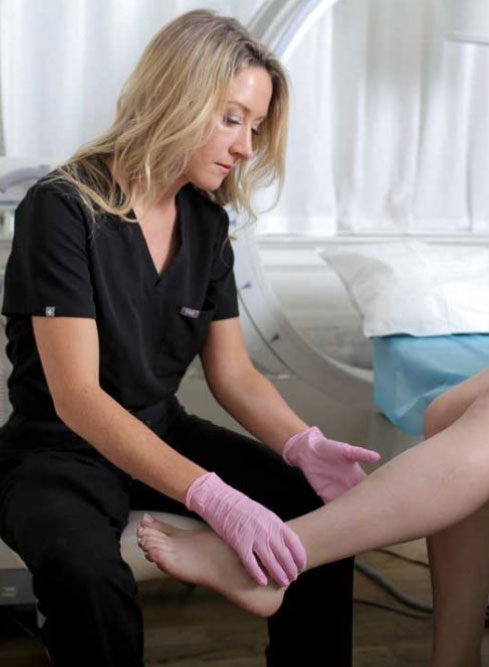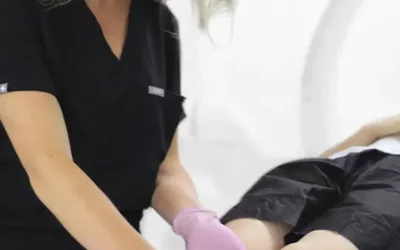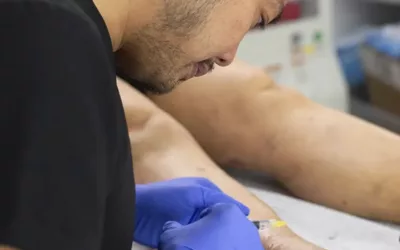Spider Vein Clinic in Houston Discusses Insurance Coverage for Varicose Vein Treatments
10/10/2020
Are minimally invasive varicose vein treatments covered by insurance plans? Spider vein clinic in Houston, Texas, answers.
We’ve come to notice one common thread amongst all our patients. Everyone who comes to our spider vein clinic in Houston has one primary concern — insurance coverage for minimally invasive varicose vein treatments. In most cases, spider vein and varicose vein treatments can be costly, so it helps to have insurance coverage. But whether your vein treatment is covered by insurance plans depends on whether it’s medically necessary.
As you may be aware, insurance plans pay to make you feel better, not look better. They only cover varicose vein treatments if they’re determined to be medically necessary. All of our varicose vein treatments are preceded with a thorough diagnostic procedure in which we use vascular imaging to determine if you have underlying chronic venous insufficiency.
Venous insufficiency is a medical condition in which your vein valves collapse. These vein valves are usually responsible for smooth one-way blood circulation to the heart. When they collapse, blood flows backward due to gravity and eventually accumulates in your leg veins. Continuous blood accumulation in the leg veins leads to spider veins, varicose veins, and other vein problems.
While most vein problems are often caused by underlying vein disease, that’s not always the case. In some situations, your spider veins may only be a cosmetic issue, i.e., they look ugly and may cause mental discomfort, but they aren’t caused by a dangerous underlying disease. As such, insurance plans only cover minimally invasive varicose vein treatments if they’re necessary to treat underlying vein disease, not for cosmetic purposes.
At Vein Treatment Clinic, Houston, we accept most major insurance plans and do our best to help you get the best insurance coverage for your treatment. Please continue reading to learn more about our minimally invasive varicose vein treatments and their possibility of insurance coverage.
Do you get insurance coverage for radiofrequency ablation?
Short Answer:
Yes, radiofrequency ablation is covered by most major insurance plans, at least partially.
Explanation:
During the radiofrequency ablation procedure, the vein doctor applies local anesthesia and creates an incision on your skin’s surface. The vein doctor inserts a catheter through the incision and into the diseased saphenous vein, as identified through vascular imaging. Once the catheter is inside, the vein doctor applies local anesthesia to the vein’s walls and activates the catheter to generate heat energy. The thermal energy collapses the diseased vein, and the accumulated blood automatically flows to healthier veins, treating vein disease.
Radiofrequency ablation is a costly procedure, and it can put you back several thousands of dollars without insurance coverage. However, most insurance plans cover at least half the treatment cost because it’s medically necessary.
Do you get insurance coverage for endovenous laser ablation?
Short Answer:
Yes, endovenous laser ablation is covered by most major insurance plans, at least partially.

Explanation:
During the endovenous laser ablation procedure, the vein dr. administers local anesthesia and creates an incision on your skin’s surface. The incision spot is used as an entry point to insert the endovenous laser, i.e., the laser fiber attached to the catheter. The endovenous laser is driven under ultrasound guidance and into the saphenous vein. Once the endovenous laser is lodged in place, the vein doctor applies tumescent anesthesia and then activates the laser fiber. The laser energy immediately destroys the diseased vein’s walls, rerouting the accumulated blood to healthier veins.
Endovenous laser ablation causes a little more post-procedural pain and discomfort than radiofrequency ablation because the laser energy is hotter than thermal energy. However, you can get insurance coverage for it because it’s a medically necessary procedure.
BOOK AN APPOINTMENT
Vein Treatments are covered by most major medical insurances, including Medicare. Verify your coverage for FREE today!
Do you get insurance coverage for VenaSeal?
Short Answer:
No, VenaSeal is not yet eligible for insurance coverage even though it’s a medically necessary procedure.
Explanation:
VenaSeal is a medical-grade adhesive used to seal vein walls. During the VenaSeal procedure, the vein doctor injects the medical adhesive into the diseased saphenous vein via ultrasound guidance. The medical adhesive fuses the vein’s walls, turning it into a hardened tissue. The accumulated blood flows to healthier veins, and the diseased vein eventually gets absorbed by the body.
VenaSeal is a relatively new procedure, having recently received FDA approval. As such, it’s not eligible for insurance coverage (yet) despite being one of the most effective varicose vein treatments.
Do you get insurance coverage for sclerotherapy?
Short Answer:
No, sclerotherapy isn’t eligible for insurance coverage because it’s a cosmetic procedure.
Explanation:
Sclerotherapy is a minimally invasive treatment in which the vein doctor injects a medicine called sclerosant into the spider veins. Sclerosant is a solution that fuses your spider veins’ walls, turning them into hardened scar tissues. The accumulated blood flows to healthier veins, and the hardened scar tissues eventually get absorbed by the body and fade away from the skin’s surface.
Sclerotherapy is a cosmetic procedure because it only removes the visible spider veins without addressing the underlying vein disease. As such, it’s only recommended as a treatment if you don’t have underlying venous insufficiency or after the primary varicose vein treatments. Sclerotherapy isn’t officially eligible for insurance coverage because it’s a cosmetic treatment. However, you can talk to your vein doctors about including sclerotherapy into your primary vein treatment.
Contact our Vein Treatment Center in Houston, Texas
Meet Our Houston
Vein Doctor

Calvin Jung MD
Spider Vein and Varicose Vein Doctor
WHAT TO EXPECT IN OUR
Texas Vein Center
contact us today
Call us
Speak instantly with one of our team members; they will answer any questions you may have regarding insurance coverage, booking an appointment and our vein treatment locations. 512-975-3421
Book online
Get directions
FEATURED POSTS BY VEIN DOCTORS
What is the treatment for varicose veins? Our vein doctors describe vein treatments in Texas
What is the treatment for varicose veins? Our vein doctors describe vein treatments in TexasMay 01, 2022What is the treatment for varicose veins?In the past, spider veins and varicose veins could only be treated via complex surgical procedures that involved...
What is a vein doctor called? And other frequently asked questions about vein doctors in Texas
What is a vein doctor called? And other frequently asked questions about vein doctors in TexasMay 01, 2022What is a vein doctor called?The official terminology for a vein doctor is a “phlebologist.” The term “phlebologist” comes from “phlebology,” which is the branch...
Our Vein Doctor in Texas Describes the Vein Treatment Process
Introducing Our Vein Doctor in Texas The Spider Vein and Varicose Vein Clinic is led by Dr. Calvin Jung, an incredibly talented and charismatic vein doctor in Texas. He specializes in vascular imaging and the latest minimally invasive spider vein and varicose vein...
What are the Qualities of a Good Vein Doctor in TX?
The vein doctor must be in an accessible vein clinic in Texas Location is certainly not the most important quality to consider when looking for vein doctors. And you must avoid the impulse to hop over to your nearest medical spa or vein center for treatment — that...


